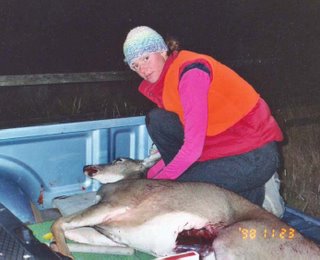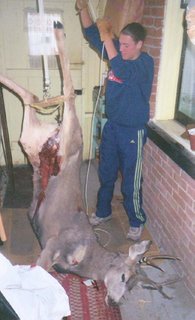 I've become a hunting mentor to a young lad or two or recently completed their hunter safetey course, have a strong desire to hunt, but do not have parents or family that hunt. [The photos here are of my daughter Emily.]
I've become a hunting mentor to a young lad or two or recently completed their hunter safetey course, have a strong desire to hunt, but do not have parents or family that hunt. [The photos here are of my daughter Emily.]A friend shared his thoughts on this issue, and believes one should teach the parent(s) to hunt, and let them take the kid hunting. Somehow, he thought that to take a lad hunting would be to replace the parent. These thoughts helped stimulate me to hone my thoughts about my hunting philosophy.
I understand the idealism about involving the mother or father in hunting as well as the child. I am doing this in once case. Though the dad does not and will not hunt, he is an experienced (sort of) outdoorsman and has the proper equipment. So he will accompany his son and I, at least on easy deer hunts where we stroll the pleasant hills of the Big Hole River and never have to drag a deer more than a mile or so. I'm not sure I could tolerate a non-hunter on the average elk hunt, however.
In thea case of my other apprentice, even an easy deer hunt would simply not be possible for the father. Not only does the father have no interest in hunting and little experience with the outdoors, but the family is very poor, the father works jobs that leave no time for hunting, the father has no outdoor clothing, and there cannot be firearms in the home because the step-mother got drunk and shot up the trailer.
In yet another case (and I've not yet decided if I can take on a third apprentice), there is a single mother who has no outdoor experience or gear, and whose physical health is rather poor.
Taking a neophyte parent who does not have proper gear or the desire to experience nature into the woods on a hunt would be disasterous. Even an easy little hunt like stalking antelope a mile or two or walking around the hills of the lower Big Hole would be far beyond what they could handle. If I hunted from a drive-up tree stand for whitetail does on a riverbottom ranch it might be possible, but in a very real sense that is not hunting--it is just shooting.
Had I not had my grandfather and his friend Bernard Dutka and my uncle's friend Joe Urban as mentors, I might have had little interest in hunting or become a very poor hunter. My father and most men I knew wouldn't make a wart on a hunter's ass. They might take a short walk in the woods if the weather was perfect and the ground was dry, but for the most part they drove the forest roads and parked in likely places, eating sandwhiches and drinking coffee, and hoping a deer might come along. They killed a fair amount of game, but they were not hunters. The antelope "hunters" I encountered Sunday were like this.
I have a friend who is fat and out of shape, and dreams of "real" hunting. Luckily he lives in the Dillon area and has permission to hunt ranches where he does not have to walk much and where game is plentiful & relatively undisturbed. To his credit, he has also worked hard at becoming an excellent shot. He confidently shoots deer and elk 400 yards away--something I cannot do. He does not road hunt, but he also does not actively pursue the beast. He is in no way practicing bad ethics, but he is also the first to admit that he is not much of a hunter.
I embrace a serious fair chase philosophy in search of what I call a "quality hunt." That is a hunt that demands knowledge of terrain and habitat, tracking or covering a lot of ground to find the beast, confidence and ability in shooting (incl. knowing my limitations), staying with the hunt in inclement weather, and carefully caring for and using the meat. All that is not to say that I spurn lucky moments, such as the nice whitetail buck that my young friend Matt shot last year as it trotted past us shortly after we had left the truck. Or the mulie buck I dusted one morning just as Dave parked the truck. I accept these gifts just as I accept the buck shot on the backside of the razor back ridge after walking all day--the buck that has to be taken across the river to the nearest road rather than dragged back over the mountain.
There is, of course, a broad scale or range for the quality hunt. A quality hunt for whitetail does on a river bottom ranch in lovely late September weather is a thing vastly different from a quality hunt for bull elk on the north side benches two miles away and two thousand feet above the nearest road with temperatures below zero and snow up to your knees. To some extent, there is a large subjective element to the definition. But every individual should be aware of alternative elements for the "quality hunt" definition--such as the need to shoot a self bow without sights, the need to pack gear 14 miles in on horseback over rough terrain, the need to track several days over a featureless savannah or tundra, etc. As we come to know alternative commitments to a quality hunt, it keeps us humble. I remind myself that Native Americans of the past and Kalahari peoples even today kill every manner of beast with simple weapons at close range in a landscape that is simply their home. That is a humbling thought when I am snuggled into wool and polarfleece, wearing gore tex boots, and squeezing the trigger on a scope mounted 25-06 aimed at an elk over 200 yards distant.

So this is the hunter's fire that I am trying to pass along to the next generation. It is too late for their parents to learn such things. Even if they had the desire, chances are they would never become good at--in the same way that few adults master a foreign language or higher mathematics. To have such parents along on a hunt would simply ruin the experience with whining about cold feet, tired legs, anxiety of being lost, noisy & jerky movement through cover, etc.
As for parenting, I don't teach it. I'll leave that to the social workers. My view of poor parents is much like my view of poor hunters. They are unlikely to have the motivation to change, and many probably do not even have the requisite ability. Also, it's possible to be a very good parent even if you never take your kid hunting.
No comments:
Post a Comment